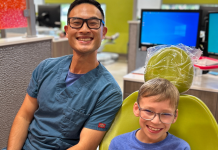My first memory of racial disparities in healthcare goes back to the early ‘90s. I was in second grade when I first learned about how HIV and AIDS were devastating the Black community. Even as a child, I questioned why this was happening—why Black lives seemed to be treated as less valuable. That moment sparked something in me.
From that day on, I immersed myself in understanding health inequities. Every school project became an opportunity to educate myself and others—whether it was writing about the Tuskegee Experiment or AIDs in the black community. By high school, I was the friend making sure everyone knew about STI risks, birth control, and reproductive health. I had become an advocate before I even knew what advocacy was.
The Legacy of Black Women in Healing
For generations, Black women have been the backbone of community healing. Before hospitals would accept Black patients, our grandmothers, midwives, and herbalists nursed the sick, delivered babies, and passed down remedies that sustained us. They weren’t just healers—they were activists, protectors, and the embodiment of resilience.
As I continued on my path to becoming a Family Nurse Practitioner, I learned about the powerful legacy of Black healthcare pioneers. Women like Mary Eliza Mahoney, the first Black nurse, and Dr. Rebecca Lee Crumpler, the first Black female physician, broke barriers so we could have a seat at the table in medicine. But long before them, our ancestors were already doing the work—birthing, healing, and advocating for our survival.
Yet despite this legacy, Black women today still face disproportionate health disparities. We are three times more likely to die during childbirth. Our pain is dismissed, our voices silenced. The burden of strength has often left us prioritizing others over ourselves. This is exactly why Aurora Maternal & Family Healthcare exists—to provide the care we need, the respect we deserve, and a space where our voices matter. Now it’s time for us to reclaim our healing.
Reclaiming Our Health: 5 Ways to Advocate for Yourself
1️⃣ Know Your History–Understanding our community’s health challenges and systemic barriers helps us demand better care. Research conditions that disproportionately affect Black families, such as hypertension, diabetes, and maternal health disparities.
2️⃣ Speak Up & Ask Questions–If a provider dismisses your symptoms, push back. Ask about alternative treatments. Request second opinions. Your voice matters.
3️⃣ Bring a Support Person–Whether it’s a friend, partner, or family member, having someone in your corner can help you feel empowered and ensure your concerns are taken seriously.
4️⃣ Keep Track of Your Health–Document symptoms, medications, and past treatments. This helps providers see the full picture and prevents misdiagnoses.
5️⃣ Seek Culturally Competent Care–Find a provider who understands and respects Black health concerns. If you don’t feel heard, don’t hesitate to switch doctors.
Honoring Our Past, Healing Our Future
Healing is in our DNA. Our ancestors taught us that health is more than survival—it’s about thriving. As we celebrate Black History Month, let’s honor those who fought for our right to receive quality healthcare and commit to taking up space in medical settings, advocating for ourselves, and prioritizing our wellness.
Because we are not just the backbone of our communities—we are the heart. And our healing? It starts with us.
💬 What’s one way you’ve advocated for yourself or a loved one in a medical setting? Let’s share and empower each other!











